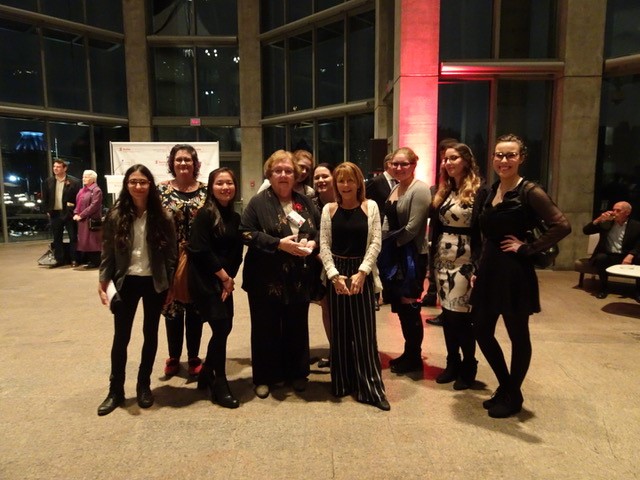Starting the Year in the Company of the Scotiabank Giller Prize Finalists
I feel a little guilty sitting down to write this blog post. After all, I’m more than halfway through first semester and I haven’t contributed to the blog at all yet in my second year. I’m not going to make excuses. Sometimes the best way to begin writing is simply sitting down and writing, even if that means staring at the expanse of white, barren land I like to call An Empty Word Document. Sometimes I even write the first phrase that pops into my head, just so that it ceases being so white and so empty. But then I thought “Student Debt” wouldn’t make a very interesting, or inspirational, blog post.
One of the reasons I’ve neglected my blogging duties has to do with the opportunities I’ve received recently to attend some amazing events. I’ve been grateful enough to attend these events this year. (Because hey, frosh is only one part of university!) There’s one event I recently attended that’s at the forefront of my mind: “Between the Pages: An Evening with the Scotiabank Giller Prize Finalists.” It was held here in Ottawa at the National Gallery of Canada. Having been invited by my first-year English professor, my best friend and I were excited to attend an event known as the “Oscars of the Book World.”

From left to right: Gheed Al Nassan, Dr. R. Norris, Kiana Choi, Dr. R. Hoey, Mrs. Elana Rabinovitch. Second row: Kelli Knox, Jordan Lundrigan, Erin McRae, Alycia Artyszuk, and Megan Shannon.
Hosted by the distinguished Canadian journalist and television personality Johanna Schneller, the event brought together the current Giller Prize finalists in a conversation about their nominated books. We sat down in a beautiful theatre, accompanied by live music and so many publishing professionals as to make me dizzy. The event began with a video montage that collated speeches from previous Giller winners. The video was a moving testimony not only to the strength of the Canadian literary world, but also to the recent passing away of the Giller founder, Jack Rabinovitch. Mr. Rabinovitch’s philanthropy and commitment to nurturing Canadian books will not be forgotten.
All of the shortlisted nominees, Rachel Cusk, Ed O’Loughlin, Michael Redhill, and Michelle Winters were there with the exception of Eden Robinson. An empty chair was placed on stage that held a portrait of a journalist who was imprisoned simply for speaking out. This chair was dedicated to people all over the world who are punished for using the power of language. I found this commemoration extremely heart-wrenching, and have been conscious of how grateful I am to be able to speak (and write) my own mind without fear of persecution.
Johanna Schneller began the discussion with an important question, “Are we defined by the worst things that we do?” After alluding to the challenges our world is facing today, the authors chose to explore the question rather than provide a definitive answer. I began to see a continuum of written language, as well as the contexts that have stretched across this continuum. I was able to appreciate the history of the Giller Prize (founded in 1994), as well as all the books that have influenced me as a young adult. After exploring a number of historical movements in my Theory and Criticism of English Literature class this year, I wonder about the future, and how I will feel when this year suddenly becomes “history.”
While many questions addressed the nominated books, the writers were also asked about their personal lives and, specifically, about their childhoods. While Cusk couldn’t remember a time when she wasn’t writing, O’Loughlin grew up attempting to conceal his love of literature, never taking any writing classes and living in fear of people’s judgement. These reminiscences intoxicated me the most. Far too often I catch myself idolizing authors, seeing them as borderline otherworldly. Sometimes I can’t even picture their lives outside of the iconic frames of reference that I associate with them. I see J.K Rowling never leaving the coffee shop in which she began writing Harry Potter. I envision Susanna Moodie at her desk, writing “Roughing It in the Bush” without ever actually going out into the bush. This discussion about the authors’ beginnings as ordinary people wanting to write pulled me back to reality. It is their own lives that allow them to create life on the page.
The authors also offered some important insights into the craft of writing. O’Loughlin relies on a different tool kit each time he writes, freeing himself from any limitations and attempting to arrive at a certain “colour” by the last page. Cusk, on the other hand, plans her writing from start to finish, viewing it as a performance that needs to have a clear vision. While I can appreciate both writing methodologies, it was the combination of Winters’ and Cusk’s final remarks that I felt most drawn to. Winters said that she writes when she’s angry, often writing to create change in the world. Cusk added that she writes to tell the truth. These two ideas of truth and change struck me as integral to my own writing. So often do I find my poetry, my fiction, and even my academic essays attempting to grasp at these ideas. It’s been the common denominator every time I put pen to paper or fingers to keyboard.
While this evening allowed me to experience the works of selected Canadian authors for this year’s Giller prize, it also made me think of next year, and the year after that. I wonder not only where I will be, but where the world will be. I hope history gives us many pages of rich stories to tell.